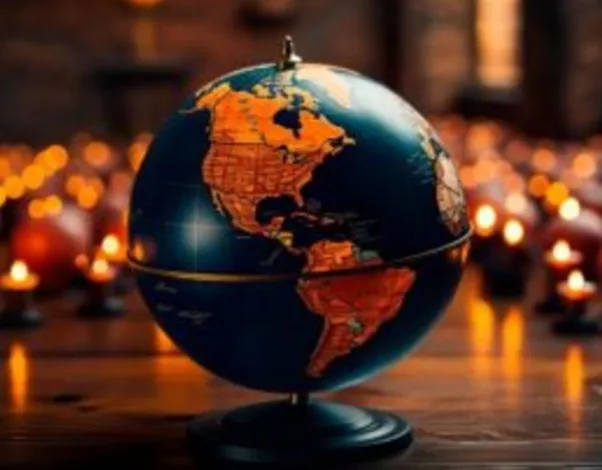
This essay is part of the “What to expect in 2024” series.
Global geopolitics is at a pivotal moment, facing the highest number of military conflicts since the Cold War. This escalation is felt worldwide, with significant hotspots affecting international relations on every continent. Two major conflicts will further dominate the landscape: the ongoing war in Ukraine, initiated by Russia, and the Israel-Hamas clash in the Middle East. While an end to these conflicts seems distant, there are emerging signs of potential diplomatic negotiations and the first ceasefire talks in 2024. Growing international pressure, notably from the Arab countries with the support of China and Russia, advocates for a two-state solution in the Middle East. In Ukraine, Russia’s unyielding ambition for complete subjugation will continue to threaten the regional stability of the European continent. The reduction in military aid and financial support by the West for Kyiv may lead to further territorial expansion by Moscow in the next year. In the Middle East, even a potential diplomatic resolution towards a two-state solution may not alleviate the direst humanitarian situation in the Gaza Strip, leaving the Palestinians with the colossal task of rebuilding in the years to come.
Furthermore, the year 2023 marked a grim episode of ethnic cleansing in Nagorno-Karabakh, with nearly 120,000 Armenians displaced due to Azerbaijan’s military actions in the ethnic Armenian enclave. However, the potential normalisation of Armenia-Azerbaijan relations in the upcoming year might offer a rare positive development in geopolitics, beneficial for global trade routes, particularly the International North South Transport Corridor (INSTC) via Iran and Central Asia to Russia given that the India-Middle East-Europe Corridor (IMEC) project was put on hold because of the military tensions in the Gulf region following the Israel-Hamas conflict and the disruption of the global choke point Bab-al-Mandeb in the Red Sea.
Additionally, the possibility of China and Russia opening a third front in the Indo-Pacific region to challenge American influence and credibility, especially before the United States (US) presidential election, is high. Russia will continue to supply North Korea with rocket and satellite technology in exchange for ammunition for its war in Ukraine. Meanwhile, China intensifies the military tensions in the South and East China Seas, complicating the geopolitical situation. This complex backdrop suggests a Cold War 2.0 scenario involving the US, China, and Russia, with minimal risk of direct military confrontation. The geopolitical context will significantly impact the political economy, technological landscape, and the evolution of global norms, rules, and standards, further reshaping global partnerships and alliances in 2024.
Against this backdrop, India emerges as a potential major beneficiary in this geopolitical scenario, strategically positioned between the conflicting interests of the US, China, and Russia. Following the 2024 elections, India’s focus on domestic and regional stability is likely to intensify. Amidst the disruption of global supply chains and the US-China mutual decoupling, India is set to become a prime destination for redirected global capital, new technological investments, and enhanced global and regional partnerships. The predictability and stability of India’s political leadership, along with increased engagement from the West and within frameworks like BRICS and G20, will solidify its position, though it may face risks from terrorism and climate-related events in the upcoming year.
China intensifies the military tensions in the South and East China Seas, complicating the geopolitical situation.
Conversely, Europe stands as one of the primary geopolitical casualties in the current transformation of international relations, notably characterized by the bifurcation of the global system. The year 2022 marked the onset of the most tumultuous period for Europe, a trend projected to exacerbate in the coming year due to overlapping demographic, structural, and systemic challenges. Furthermore, Europe is poised to experience heightened political polarisation during the 2024 election cycle, potentially leading to expected surges in both right- and left-wing populism, alongside significant reshuffles within the European institutions. This period signals a definitive end to the era of dominant traditional and centrist parties, which have historically represented a large segment of the middle class. Compounding these political upheavals, Europe will face a deteriorating economic situation because of the deteriorating security situation as well as complicated relations with China. This decline coincides with the emergence of a new ‘Iron Curtain’ in 2024, stretching from the Scandinavian countries through the Baltics, Central and Eastern Europe, to the Black Sea and Turkey, marking a significant geopolitical shift.
In this landscape, ‘middle powers’ or ‘swing states’ are set to gain increased geopolitical relevance, buoyed by their strategic locations, technological prowess, or access to critical raw materials and rare earths. Many of these influential states are located in the Global South, with countries like Mexico, Indonesia, Brazil, and Türkiyé poised to elevate their presence on the global stage. As we look toward the future, it’s evident that 2024 will further lay the foundation for a new world order, shaped by five major geopolitical trends. These include the ongoing bifurcation of the global system and the irreversible decoupling between the US and China, which are set to disrupt the global economy, trade, and critical supply chain chokepoints. Key areas to watch include the Red Sea, the Strait of Hormuz, the Strait of Malacca, the Black Sea, the Taiwan Strait, and the Panama and Suez Canals. Additionally, the fluid geopolitical alignments of middle powers oscillating between America and China, without firmly taking sides, will continue to erode the coherence of global organisations and networks. The relationships between major Asian powers, particularly China and India, will gain greater geopolitical and geoeconomic significance. While some tensions may arise in 2024, both nations are expected to strive to manage their relationship to ensure regional stability. Last but not least, a major development is the emergence of the ‘DragonBear‘ modus vivendi, a strategic coordination between China and Russia in global geopolitics, juxtaposed against the U.S.’ strategic pivot towards the Indo-Pacific, further diminishing Europe’s geopolitical importance.
The relationships between major Asian powers, particularly China and India, will gain greater geopolitical and geoeconomic significance.
The new era of Cold War 2.0 between America and the ‘DragonBear’ is anticipated to be far more unpredictable, unstable, and volatile due to the extensive interconnectedness of the current global system. Like the interwar period, the contemporary era could be seen as a brief respite between the first and second Cold Wars. The current period mirrors the first period of the post-World War II era in its transformative nature. Despite the uncertainties, there are optimistic projections for 2024: no World War III or direct military confrontation between the US, China, and Russia; rather low risk of a military attack by China on Taiwan; and no use of nuclear weapons by Russia against Ukraine.
In this fragmented global landscape, the Global System must adopt a balanced approach in international relations, championed by a coalition of middle powers and rising geopolitical stars like India. Failing to do so could result in fractured societies, polarized geopolitics, and fragmented economic and trade ties. Lenin’s words, “There are decades where nothing happens, and there are weeks where decades happen,” resonate profoundly nowadays. The year 2024 is poised to be a period of significant transformation, characterised by further extensive changes on both domestic and international fronts.
Velina Tchakarova is the Founder of FACE and a Visiting Fellow at the Observer Research Foundation
The views expressed above belong to the author(s). ORF research and analyses now available on Telegram! Click here to access our curated content — blogs, longforms and interviews.




 PREV
PREV


